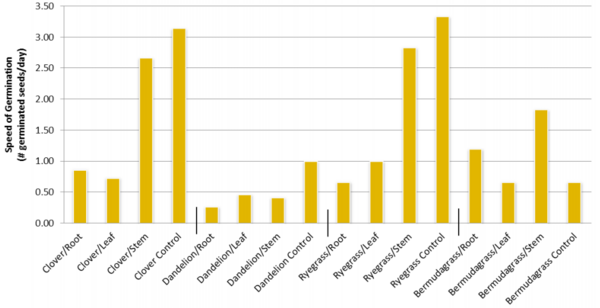Allelopathic Effects of Kudzu (Pueraria montana) on Seed Germination and Their Potential Use As a Natural Herbicide
(1) Oxford High School, Oxford, Mississippi
https://doi.org/10.59720/13-014
Allelopathy is the inhibition of growth of one species of plants by chemicals produced by another, typically competing, species. The chemical compounds released in this phenomenon have the potential to be used as natural weed control agents. In this study, we tested kudzu (Pueraria montana) to determine its allelopathic potential for weed control and suppression. The aqueous extracts of different kudzu organs (leaf, stem, and root) were assessed for allelopathic properties on the seeds of several competing species: white clover, dandelion, bermudagrass, and ryegrass. Remarkably, both the kudzu leaf and root extracts significantly changed the majority of the measured germination indices, comprising total germination and the speed of germination. The total germination of white clover seeds was 25% less than the control in both the kudzu leaf and root extract bioassays, while speed of germination was reduced by 77% and 72%, respectively. Likewise, dandelion seeds demonstrated 53% and 73% reduced speed of germination when treated with kudzu leaf extract and root extract, respectively. Both leaf extract and root extract also reduced total germination in ryegrass and bermudagrass seeds by a minimum of 25%. These results suggest that the kudzu leaves and roots can be considered to be allelopathic and show potential as a weed control agent.
This article has been tagged with: